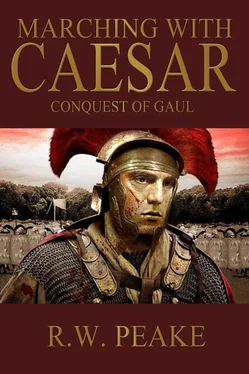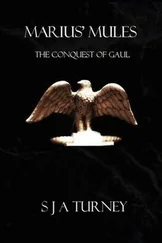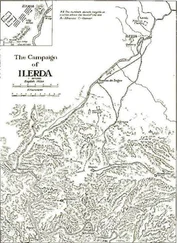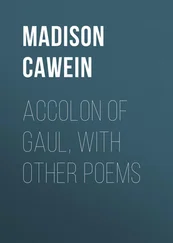R. Peake - Marching With Caesar - Conquest of Gaul
Здесь есть возможность читать онлайн «R. Peake - Marching With Caesar - Conquest of Gaul» весь текст электронной книги совершенно бесплатно (целиком полную версию без сокращений). В некоторых случаях можно слушать аудио, скачать через торрент в формате fb2 и присутствует краткое содержание. Жанр: Исторические приключения, на английском языке. Описание произведения, (предисловие) а так же отзывы посетителей доступны на портале библиотеки ЛибКат.
- Название:Marching With Caesar: Conquest of Gaul
- Автор:
- Жанр:
- Год:неизвестен
- ISBN:нет данных
- Рейтинг книги:3 / 5. Голосов: 1
-
Избранное:Добавить в избранное
- Отзывы:
-
Ваша оценка:
- 60
- 1
- 2
- 3
- 4
- 5
Marching With Caesar: Conquest of Gaul: краткое содержание, описание и аннотация
Предлагаем к чтению аннотацию, описание, краткое содержание или предисловие (зависит от того, что написал сам автор книги «Marching With Caesar: Conquest of Gaul»). Если вы не нашли необходимую информацию о книге — напишите в комментариях, мы постараемся отыскать её.
Marching With Caesar: Conquest of Gaul — читать онлайн бесплатно полную книгу (весь текст) целиком
Ниже представлен текст книги, разбитый по страницам. Система сохранения места последней прочитанной страницы, позволяет с удобством читать онлайн бесплатно книгу «Marching With Caesar: Conquest of Gaul», без необходимости каждый раз заново искать на чём Вы остановились. Поставьте закладку, и сможете в любой момент перейти на страницу, на которой закончили чтение.
Интервал:
Закладка:
The sight of the ravaged fleet, the ships laying in various stages of damage, with debris scattered among them as witness to the severity of the storm, was a sobering sight. There was a feeling that we were once again being tormented by the gods and there were mutterings among us that perhaps at least one legend about this island, that it was cursed, was true. Those Cohorts left behind were already clearly busy, the Centurions organizing them into working parties to begin the operation of repairing the fleet. We were Caesar’s men, meaning if there was one thing we learned under his command it was that of all the enemies we faced, the greatest one was time. It was well into summer, so there could be no delay in repairing the fleet because we had already witnessed the severity of the weather in this channel once it got later in the year. Caesar had no choice but to put offensive operations on hold, not only from the viewpoint that it was the strategically sound thing to do, but also because we in the ranks would constantly worry about how we were going to leave the island. It would have dominated the conversations around the fire every night, as well as the watches of marching, so it was wise of Caesar to put these fears to rest. Of course, nothing was said openly on this topic, since it would give an indicator that we did not have faith in our general. Nevertheless, there was a silent sigh of relief when our orders were confirmed that we would be working on the fleet until further notice. The men designated to perform certain tasks the winter before now went back to them, and very quickly, work began to repair the fleet.
The immunes labored through every watch, doing their jobs by the light of oil lamps during that brief period of time where it was dark enough to justify the extra light. They were set up in shifts, so that they could snatch some sleep and feed themselves, yet they worked extremely hard nonetheless. Caesar also sent for more skilled workmen, via his fastest galley, and they were soon added to the workforce. In order to prevent a catastrophe of this nature happening a third time, Caesar ordered the construction of an enclosed area, much in the nature of a fort, placed at a point where neither the highest tide nor the most severe storm could wreak any damage. Because of the space needed to contain all of the ships, it was by far the largest project of this type we ever worked on, and even with the labor of 20,000 experienced and willing men, construction of the enclosure took more than three days. Once it was completed, we began the process of moving the ships up off the beach and across the ground, thankfully flat, through one of the gates of the enclosure, of which there were four in the normal manner, except that they were all large enough to accommodate the width of our largest transports. Using huge amounts of grease brought over from Gaul that we applied to a number of logs, we pulled the ships across the rollers into the enclosure, where the men skilled as shipwrights began their work. Day and night, the activity was incessant, and it was of the type that had all of us praying to be selected for guard duty. Normally we abhorred it because it was so boring yet also so easy to find oneself in some sort of trouble. Even so, we felt it was better than the alternative. We were not one of the lucky Cohorts until almost the very end of the project, where we stood on the ramparts gazing out at a large group of Britons who we were told had made it a habit to come watch us work, seemingly fascinated at our activities.
“They think we’re completely crazy,” Vibius commented.
I nodded my head, since this was the same thought running through my mind as Vibius and I stood, watching them watch us, either on horseback or sitting on the platform of a chariot, ready to bolt at the first sign that we would order the cavalry out to pursue them. They were not painted for war, yet we did see something that either escaped our notice the year before, or was evidence of a new tribe entering the picture, because some of the men had done something very interesting to their hair. Using what we would find out later was a mixture of lime and water, they made their hair stand on end in great spiked tufts. Apparently this was designed to strike fear into their enemies, but I am afraid that at least as far as we were concerned, the effect was more of some amusement than anything else. We had long since learned that men adorning themselves in a certain way, or wearing certain clothes did not make them any more or less hard to kill; the only exception to this of course was whether what they were wearing was designed to protect them in a practical manner, like armor. Otherwise, we were singularly unimpressed with the lengths that men went to in order to try and give themselves an extra edge in battle.
Work on the damaged ships continued until the end of the month; finally, we had affected the necessary repairs, and ensured the security of the fleet to an extent approved by the Legions with the construction of the enclosure. Turning our attention back to the Britons, we saw they were not idle either, as it turned out. Like most of the tribes on the mainland, the tribes of Briton have their own internal political struggles and rivalries, their hatred of each other only set aside because their hatred of us was greater. During the time we spent repairing the fleet, they were working on the political front, with an alliance formed between the tribe initially facing us, the Trinovantes, and one of the most powerful tribes, led by a man named Cassivellaunus. It was his warriors with the spiked hair that we saw watching us a couple of days before. Picking up where we left off, a force was left behind to guard the camp and enclosure, with the rest of the army retracing our steps back in the direction of the camp we made earlier in the month. There was one difference this time; the Britons were not going to be content to wait for us to come to them.
Marching in column with our cavalry as a screen around us, the first attacks began, predictably with their chariots and some cavalry. Our horsemen successfully repulsed the attacks, though as was usual with our Gallic cavalry, their passions ran high. When things went well, they were incredibly fierce and aggressive. This time was no exception and they pursued the Briton chariots into some nearby woods, which was their mistake. Almost immediately their shouts of triumph turned to cries of alarm when they were set upon by warriors waiting in the woods. Not more than a handful of moments later, our cavalry came streaming out of the woods, many of the horses without men riding on them. Pressing on, we watched for further attacks, yet the Britons seemed to be content to trail along on our flanks, much like wolves do when they are stalking a herd of animals, waiting for the one that cannot keep up to provide them with their evening meal. Moving over the open ground, we approached the same river as before, to find that for the most part our camp was left largely undisturbed. All that needed to be done was to place the stakes of the palisade and repair some of the ditch that had fallen in, and we immediately set to work, confident that the Britons would refrain from attacking us.
We were wrong, very wrong. While we were repairing on our portion of the camp, close to the PortaDecumana , a great shout arose from the guard Cohorts placed a short distance out from the main gate. Because of the nearby enemy Caesar doubled the guard to two Cohorts, but these were men from the 8th, and despite being veterans, they were not part of the expedition the year before and consequently had not faced the chariots before this. Also, the Britons were more committed this time, and under better leadership by the Briton Cassivellaunus, resulting in the two Cohorts being quickly surrounded by the fast-moving chariots, their warriors leaping off them to run quickly up to the Legionaries to slash and thrust at their selected target, only to dash away back to the chariot when pursued by our men. Along with the chariots came a large number of men on foot using the same tactics, not packed together like they usually were, but in loose order, rushing in and out in a similar manner as the chariots. Caesar quickly ordered two more Cohorts to the aid of the guard, except they were of the 8th as well and did not go out together as one unit, but with an interval of perhaps 200 paces between them. This was enough of a gap to allow the Britons to surround each Cohort in turn, the chariots speeding in between the two, the warriors hurling their javelins at the hurrying Legionaries, some of them inevitably finding their mark, felling several of our men. The battle was barely visible because of all the dust created by the chariots crisscrossing back and forth in front of and around the Cohorts, so it was only in brief snatches when the whirling dust parted for just a moment that we could see our men fighting for their lives. All work had virtually ceased as we all tried to see what was happening, shading our eyes and speculating among ourselves what was happening.
Читать дальшеИнтервал:
Закладка:
Похожие книги на «Marching With Caesar: Conquest of Gaul»
Представляем Вашему вниманию похожие книги на «Marching With Caesar: Conquest of Gaul» списком для выбора. Мы отобрали схожую по названию и смыслу литературу в надежде предоставить читателям больше вариантов отыскать новые, интересные, ещё непрочитанные произведения.
Обсуждение, отзывы о книге «Marching With Caesar: Conquest of Gaul» и просто собственные мнения читателей. Оставьте ваши комментарии, напишите, что Вы думаете о произведении, его смысле или главных героях. Укажите что конкретно понравилось, а что нет, и почему Вы так считаете.












